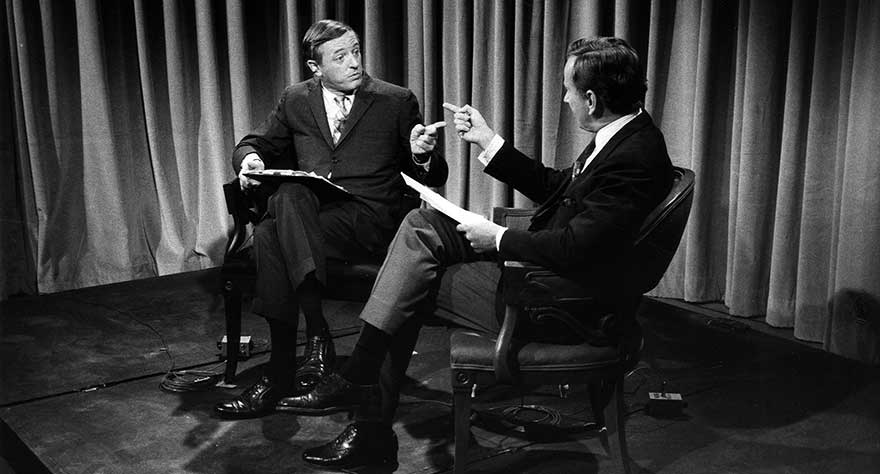Hot Docs 2015: Best of Enemies

There’s a cheap tactic documentarians like to lean on sometimes that I call the “pin drop moment”. It happens in talking head documentaries when some sort of major event or piece of information gets dropped on the viewer. To emphasize just how important this fact is, the director will cut to various interview subjects sitting silently. The intent is to give off the impression that everyone is stunned into silence over what just transpired on-screen (you could hear a pin drop!). In reality, it’s just footage of each talking head probably waiting for the next question to be asked.
Cheap manipulation tactics like the pin drop moment are second nature to Best of Enemies co-director Morgan Neville, who directed the overrated and poorly directed Twenty Feet From Stardom. In Best of Enemies, directors Robert Gordon and Morgan Neville present a bland, surface level presentation of one of television’s most memorable events: a 10 part debate between National Review founder William F. Buckley Jr. and infamous writer Gore Vidal during the Republican and Democratic National Conventions in 1968. Both were highly renowned intellectuals at the time, and both stood at the opposite ends of the aisle. Buckley, a staunch conservative who’s credited with bringing in the Reagan era, found Vidal’s writing pornographic, and Vidal thought Buckley was as valuable as dirt.
ABC News aired the debates as a desperate move to improve ratings—they were dead last in the ratings—and it worked, only because the debates turned out to be more of a catfight than a discussion. Neville and Gordon don’t need to do much to entertain; watching Vidal and Buckley tear into each other is glorious to watch. But why do I need this movie when I can just watch the debates on YouTube? Neville and Gordon don’t really add much to the footage itself, other than giving some context and talking about how the debates impacted both men after the fact (Surprise: they never got over it!). This is boring infotainment at its finest, an excuse to give people basic facts (or, as Werner Herzog calls it, “the truth of accountants”) without trying to delve into anything interesting. The only time Best of Enemies suggests something worthwhile is when it argues that the debates signaled the beginning of the end of the golden era of TV news, with arguing pundits replacing objective reporting. But that argument only starts when, and I’m not kidding, the end credits start rolling. There can’t be a clearer sign of bad documentary filmmaking than reducing the most substantive part of your film to nothing more than an afterthought.
